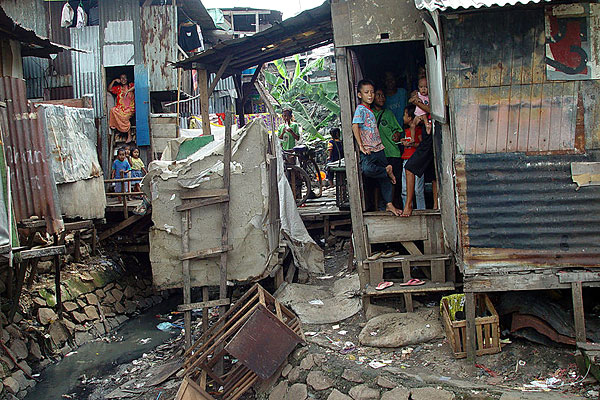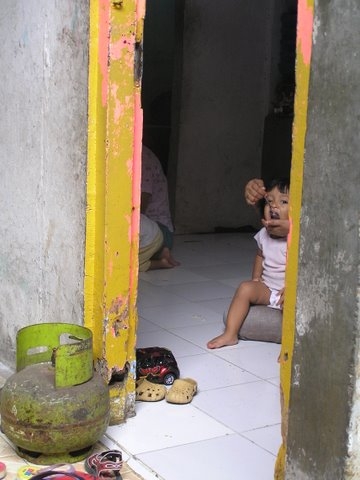It’s the day before the Presidential elections. Ibu Oda grins when she reaches deep in her handbag and takes out an envelope. ‘Yesterday they offered me money to vote for Prabowo’, she whispers, while showing me the contents. “Do not forget who cares for you”, they told me. “I just accepted the money and voted for Jokowi nevertheless. What can I say in my own defence? I am poor, and I need the money. While the last thing I need is Prabowo to become president. No matter what those people claim, he will only make my life more difficult, as he could not care less about people living in slums like this”.
‘They’ or ‘those people’ to whom Oda refers are people working for the kelurahan, the political subdistrict. According to different residents of this poor, flood-prone riverbank community in Jakarta, they entered the neighbourhood late in the evening, two days before the elections and offered people money in return for votes for Prabowo. Some people received Rp 20.000 (AU$1.80), others up to Rp 50.000 (AU$4.50), the equivalent of a week’s salary in this community.
The money is certainly welcome, especially as it’s Ramadan and with Idul Fitri is nearing. ‘With this money I’m gonna buy food to break the fasting’, says Oda, who earns on average 40.000 rupiah per week washing clothes. ‘I actually hope they’ll return with more money, so that I can buy my grandson new clothing for Idul Fitri’.
This was my first time back to the kampong three years after my fieldwork finished up. I wanted to meet my old friends. I happened to arrive right before the elections, so naturally, my conversations with residents rotated around Indonesia’s future president. On election day, I learned that most of them voted for Prabowo. In two RT’s (neighbourhoods) in my old field site, Prabowo received the majority of votes; in one, Jokowi won, but only by seven votes.
One reason people here voted for Prabowo is that they don’t want to lose Jokowi. As I described in an earlier piece, although the residents of the riverbank community have great faith in him as a politician, they voted against him because they believe he is more use to them as city governor than as President. ‘As a governor he is still close to the poor people of Jakarta. If he becomes President he will be busy with other political business and he will forget about us’, people typically reasoned. Voting for Prabowo was a strategy of the poor to keep Jokowi near.
Another reason people voted Prabowo was because their votes were bought by local political supporters, as Oda explained above. But if money politics was rife, so too was coercion. In some cases, people felt forced to vote for him. Asides from the kelurahan people, another group of strangers wandered the neighbourhood in the evenings before the elections. Pak Sur, a 51-year old seller of fried snacks tells me about them right after he put his vote in the box: ‘I just came back from the market and I was unloading my cart, when a man whom I had never seen before approached me. ”You want this neighbourhood to be safe?”, he asked. ”Vote for Prabowo, or else it will no longer be safe”’.
Five riverbank settlers told me a similar story, all in the same words: “vote for Prabowo, or else it will no longer be safe.” People weren’t sure who these strangers were but they associate them with the army, describing them as ‘military friends of Prabowo’. Aside from Pak Sur, who claims to ‘be afraid of no-one, not even the army”, everyone who received the threat voted for Prabowo.
A final reason why people in this neighbourhood voted for Prabowo was the dominance of the civil militia organisation FBR in this neighbourhood. The kampong head here is an FBR leader so residents felt they had little choice other than following his advice, which was to vote for Prabowo.
“Jokowi seemed unwilling to cooperate with us”, explains the FBR leader to me, “while Prabowo already announced in the media that he will support FBR. Therefore I have pressed residents to vote for him.’ This tactic worked well – in the area where the FBR leader governs, almost 80 percent of residents voted for Prabowo. May explained that even though they liked Jokowi better, they need FBR’s support for their daily survival. ‘FBR helps us when there are floods or when evictions loom. We must support FBR in return’.
The morning after the elections, I ask residents who they believed had won. Most quick counts at this point in time indicate that Jokowi did so. One TV station shows that Prabowo wins. To make things more confusing for the residents, both Prabowo and Jokowi claim to have won. We talk about the possibility of fraud in the recount. ‘Oh well’, says Ibu Oda calmly, ‘corruption, there, corruption here. We have to wait and see who wins in the end. If that happens to be Jokowi, who knows, perhaps I will actually get a better life. With Prabowo, life will get harder for us. But hey, at least I got some money out of him.’
Roanne Van Voorst is a lecturer in Social and Cultural Anthropology at the University of Amsterdam.
 Facebook
Facebook  Twitter
Twitter  Soundcloud
Soundcloud  Youtube
Youtube  Rss
Rss 
